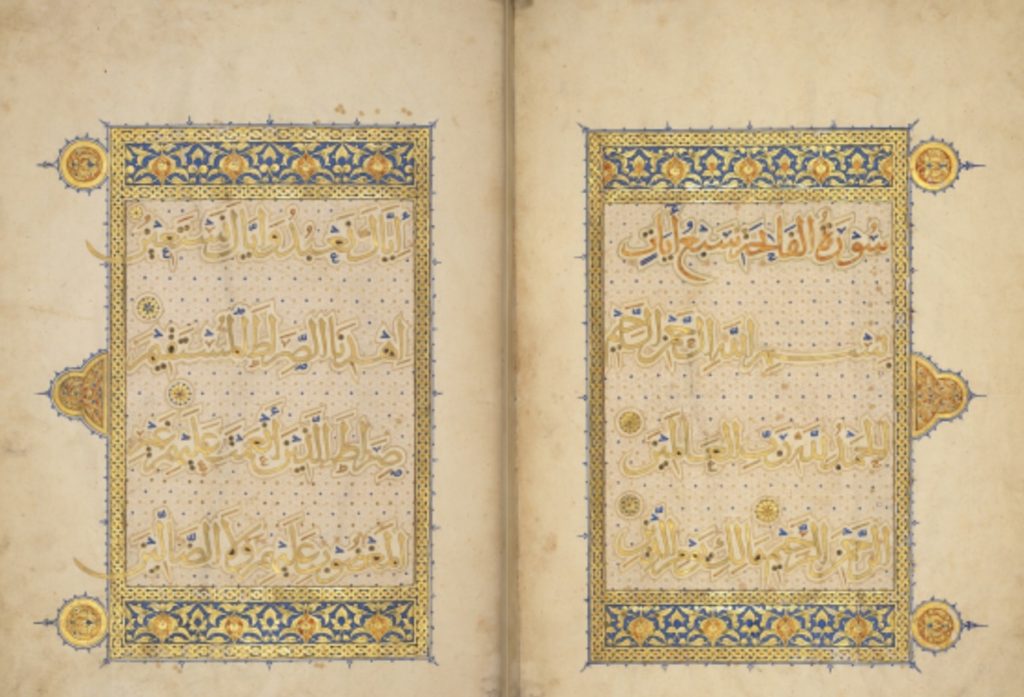
It says in Sūrat al-An‘ām verse 99: He it is Who sendeth down water from the sky, and therewith We bring forth buds of every kind; We bring forth the green blade from which We bring forth the thick-clustered grain; and from the date-palm, from the pollen thereof, spring pendant bunches; and gardens of grapes, and the olive and the pomegranate, alike and unlike. Look upon the fruit thereof, when they bear fruit, and upon its ripening. Lo! herein verily are portents for a people who believe.
FIRST OF ALL, at the beginning of the verse the author of the Qur’ān describes Allah by saying: He it is Who sendeth down water from the sky and with this expression He it is Who Muḥammad is referring to Allah. That means that Allah is not the speaker in this sentence.
Secondly – following that the form of speech changes directly from the third person pronoun for the absent He, to the first person who speaks as one present. So the absent third person (He it is) now speaks saying (therewith We bring forth buds). For the sake of continuity it would be more correct for the sentence to go on as: therewith He brings forth buds of every kind. The phrase He it is Who does not indicate that the speaker of the sentence is Allah.
Thirdly – Most of the verbs of this verse govern the accusative (object) case since they are the object of the subject of the sentence – that is, Allah who sendeth down water … bring forth grain. Then the accusative object changes into the nominative subject in mid-sentence. But the context of phrase requires one to say: and from the date-palm and its pollen – pendant bunches (object case), in agreement with what preceded it. But instead we find pendant bunches in the nominative case,[1] as if it were the subject of and from the date-palm.[2]Then the verse continues with the accusative object case for the rest of the nouns (gardens – olive – pomegranate).
Does this confusion in the rules of grammar, this distortion of the Arabic language and the transition from the absent third-person subject to the present first-person, evidence a miracle in the language of the Qur’ān – which is held to be the model for Arabic grammar – or does it evidence linguistic shortcomings, and the confusion in the author or writer of the so-called eloquent Qur’ān?
Who is the speaker in verse 114 of Sūrat al-An‘ām?
The Jews asked Muḥammad the Prophet of Islam to adjudicate between, and he said:
Shall I then seek a judge other than Allah? And He it is Who has revealed to you the Book (which is) made plain; and those whom We have given the Book know that it is revealed by your Lord with truth, therefore you should not be of the disputers.
At the beginning of the verse, the speaker is Muḥammad addressing the Jews (Shall I then seek a judge other than Allah?) and then refers to Allah in the third person (And He it is Who) because the Messenger is speaking on behalf of Allah. Then suddenly Allah becomes the speaker, and says to Muḥammad: those whom We have given the Book know that it is revealed by your Lord with truth, therefore you should not be of the disputers.
Is the Qur’ān the words of Muḥammad too, or exclusively of Allah?
Is it correct for Allah to say: it is revealed by your Lord or it is revealed by us ? Is the Qur’ān the speech of Allah or Muḥammad? Why is the beginning of the verse the speech of Muḥammad (Shall I then seek a judge other than Allah?) – the letter ī at the end of the verb أَبْتَغِي abtaghī indicates that the speaker of the verb is someone who is speaking about Allah, and not Allah Himself who is speaking. Is the Qur’ān the words of Muḥammad too, or exclusively of Allah?
The same mistake occurs in Sūrat Fāṭir, verse 9. Here the speaker is Muḥammad who speaks of Allah in the third person (omitting here the pronoun ‘he’):
And Allah (-) Who sends the winds so they raise a cloud, then We drive it on to a dead country, and therewith We give life to the earth after its death;
Muḥammad speaks first and then the speech changes to the tongue of Allah. It is said in penal law that the criminal, no matter how cautious he be in committing his crime, must needs leave a mark from which investigators can identify him, so that he is convicted. The shaykhs of Islam do not dare to discuss this issue of grammar.
Words inserted between the lines of the verse which do not fit the context
It says in Sūrat al-An‘ām verse 151:
Say: Come, I will recite unto you that which your Lord hath made a sacred duty for you: That ye ascribe no thing as partner unto Him and that ye do good to parents, and that ye slay not your children because of penury – We provide for you and for them – and that ye draw not nigh to lewd things whether open or concealed. And that ye slay not the life which Allah hath made sacred, save in the course of justice.
If it is Allah reciting these prohibitions one after the other (do not associate anything with Him – slay not your children – draw not nigh to lewd things – slay not the life) why was show kindness to your parents inserted in between these prohibitions? Is it also a prohibition, or is it a kind of Qur’ānic rhetoric that we are unfamiliar with?
It says in Sūrat Luqmān verse 13 when Luqmān is advising his son: O my son! do not associate aught with Allah; most surely polytheism is a grievous iniquity. It then continues (verses 14-19):
14 – And We have enjoined man in respect of his parents – his mother bears him with faintings upon faintings and his weaning takes two years– saying: Be grateful to Me and to both your parents; to Me is the eventual coming.
15 – And if they contend with you that you should associate with Me what you have no knowledge of, do not obey them, and keep company with them in this world kindly, and follow the way of him who turns to Me, then to Me is your return, then will I inform you of what you did;
16 – O my son! surely if it is the very weight of the grain of a mustard-seed, even though it is in (the heart of) rock, or (high above) in the heaven or (deep down) in the earth, Allah will bring it (to light); surely Allah is Knower of subtleties, Aware;
17 – O my son! keep up prayer and enjoin the good and forbid the evil, and bear patiently that which befalls you; surely these acts require courage;
18 – And do not turn your face away from people in contempt, nor go about in the land exulting overmuch; surely Allah does not love any self-conceited boaster;
19 – And pursue the right course in your going about and lower your voice; surely the most hateful of voices is braying of the asses.
In verse 13, the speaker in the Qur’ān is Luqmān who preaches to his son and commands him to perform good and kindly deeds. Then in verse 14 the speaker changes suddenly from Luqmān to Allah, who advises Man with regard to parents and that he should be grateful to Him, and (in verse 15) that Man is not to associate partners with Him. Then in verse 16 it is Luqmān again, advising his son once more.

Suggested Reading
The question here is how did verses 14 and 15 come to be inserted in the midst of Luqmān’s address to his son. Is this how it was revealed, or is it a faulty arrangement of the verses, with speech interpolated into a place it does not belong? Is this how the Book that makes things clear[3]should be? Let the shaykhs and jurists of Islam respond to us and solve this mystery.
It says in Sūrat al-Qiyāma verses 13-14:
Man shall on that day be informed of what he sent before and (what he) put off;
Nay! man is perceptive (witness) against himself.
The word evidence (baṣīra) is a feminine adjective, whereas man (insān) is masculine, and the correct form of the adjective here should be baṣīr.
Is this a book then that was revealed in plain Arabic speech [4] and its verses made clear,[5] to be studied in classes of Arabic grammar and inflection? And this while it contains many errors in the grammar, inflection and eloquence, with sentences crammed in that are out of place? One where the speaker jumps from being present in the first person to absent in the third person?
[1] In the Arabic text this should be قنواناً دانية (qinwān-an dāniyat-an) instead of قِنْوَانٌ دَانِيَةٌ (qinwān-un dāniyat-un). (Ed.)
[2] Hence the insertion, in the English translation, of the verb spring, which is not in the Arabic. (Ed.)
[3] Qur’ān XLIV (al-Dukhān), 2-3: By the Book that makes things clear, Lo! We revealed it on a blessed night – Lo! We are ever warning.
[4] Qur’ān XXVI (al-Shu‘arā’), 192 and 195: And most surely this is a revelation from the Lord of the worlds … In plain Arabic speech.
[5] Qur’ān XLI (Fuṣṣilat), 3: A Book of which the verses are made clear.
